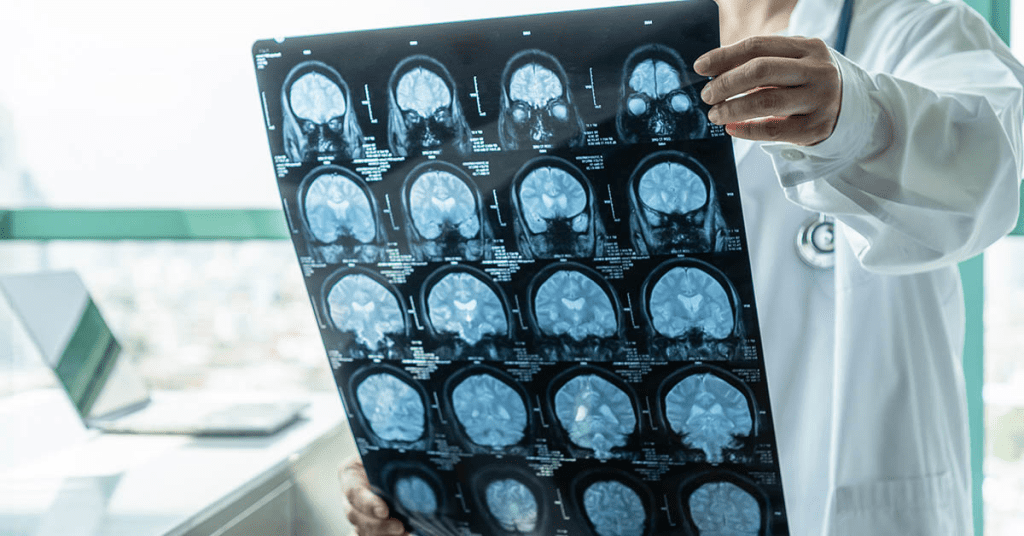When it comes to maintaining a healthy lifestyle, we often focus on physical fitness and nutrition, but there’s a critical aspect of well-being that many overlook—brain health. According to Dr. Kim Johnson Hatchett, a neurologist, one of the scariest things she regularly observes is how people neglect physical activity, particularly strength training, and the alarming impact this can have on their brain. In this article, we’ll delve into what Dr. Hatchett reveals as one of the most dangerous habits people are adopting, which could lead to lasting cognitive damage.

Muscle Weakness: A Silent Brain Killer
The Connection Between Muscles and the Brain
Dr. Hatchett emphasizes that muscle weakness isn’t just a physical issue—it’s deeply connected to brain function. Many of her patients come to her with complaints about mobility issues or a lack of physical strength, but they rarely consider how this could be affecting their cognitive health. “People don’t realize that neglecting muscle movement deprives the brain of nerve growth factor (NGF),” she explains. NGF is a critical peptide that supports the health of neurons and myelin, both of which are essential for maintaining cognitive function.
Without regular movement, particularly strength training, the brain doesn’t receive the same stimulation it needs to maintain these functions. As a result, the risk of cognitive decline and diseases such as dementia increases significantly. This silent connection between muscle weakness and brain health is one of the scariest trends Dr. Hatchett sees in modern society.
The Inactivity Epidemic
How Modern Lifestyles Are Harming Brain Health
In today’s fast-paced world, many people find themselves leading sedentary lifestyles, often prioritizing work, social media, or binge-watching TV over physical activity. The demands of modern life, especially for individuals in their 30s and 40s, often push exercise to the back burner. But this lack of movement has serious consequences for brain health, according to Dr. Hatchett.
“Even a little bit of daily movement reduces your dementia risk,” Dr. Hatchett warns. She explains that skipping workouts not only affects physical health but also has severe implications for cognitive well-being later in life. The longer people stay inactive, the more they risk long-term damage to their brain function.
The Brain’s Response to Exercise
How Physical Activity Boosts Cognitive Function
One of the key ways that exercise helps the brain is by improving blood flow. Every time you engage in physical activity, especially cardio and strength training, the brain receives increased blood flow, which helps boost cognitive function and overall mental clarity. This increased blood circulation delivers more oxygen and nutrients to the brain, supporting neuronal health and brain plasticity.

Credit: Pixabay
“Engaging in new physical activities, such as learning a new sport or workout routine, stimulates the brain and creates new neural pathways,” says Dr. Hatchett. These new connections strengthen over time with repetition, helping to protect the brain against cognitive decline and build both physical and mental resilience.
The Importance of Strength Training
Why Muscle Mass Matters for Brain Health
As we age, muscle mass naturally declines—a process known as sarcopenia. This muscle loss becomes more pronounced after the age of 50, and without regular strength training, it can significantly impact daily activities such as lifting objects, walking, and even maintaining balance. But the effects aren’t limited to the body. Dr. Hatchett stresses that “maintaining muscle mass is crucial not just for mobility but for cognitive health as well.”

Credit: Pixabay
Strength training helps preserve and build muscle mass, which in turn supports brain health. By incorporating strength exercises into your daily routine, you’re doing more than just keeping your body fit—you’re also protecting your brain from the effects of aging. Dr. Hatchett recommends that people of all ages incorporate resistance training into their lives to prevent the rapid decline of both muscle and cognitive function.
Taking Control of the Aging Process
Preventing Cognitive Decline Through Movement
One of the key messages from Dr. Hatchett is that the decline of both the body and mind with age is not inevitable. Many people assume that becoming physically and mentally weaker as they get older is just part of life, but according to Dr. Hatchett, this doesn’t have to be the case.

Credit: Pixabay
“Regular physical activity, especially strength training, acts like an investment in future health,” she explains. Just as people save money for retirement to ensure financial security, they should be investing time and effort in exercise to guarantee a higher quality of life as they age. Strength training in particular helps to maintain mobility, independence, and mental sharpness well into old age.
Starting Early: It’s Never Too Late to Begin
Building a Routine That Supports Brain Health
The good news is that it’s never too late to start improving your brain health through physical activity. Whether you’re 25 or 65, incorporating movement into your daily life can make a significant difference in both your physical and cognitive health. Dr. Hatchett encourages people to start small if they’re new to exercise. “Even 10 minutes of strength training a few times a week can make a big impact,” she says.

Credit: Pixabay
Simple bodyweight exercises like squats, lunges, or push-ups can help build muscle without the need for a gym or specialized equipment. Over time, increasing the intensity and duration of your workouts will further enhance the benefits, ensuring long-term brain health and physical vitality.
Conclusion: Protecting Your Brain Starts with Movement
Dr. Kim Johnson Hatchett’s insights serve as a powerful reminder of the deep connection between physical activity and brain health. Neglecting regular movement, especially strength training, poses a significant risk to both cognitive function and overall well-being. The good news is that preventing this decline is within your control. By incorporating exercise into your daily routine, you can build both a stronger body and a sharper mind, ensuring a better quality of life as you age.
As Dr. Hatchett wisely says, “Getting weaker as you age is not inevitable”—and the best way to fight against that is to start moving now. So, lace up those sneakers, grab some weights, and take the first step towards safeguarding your brain and body for years to come.


